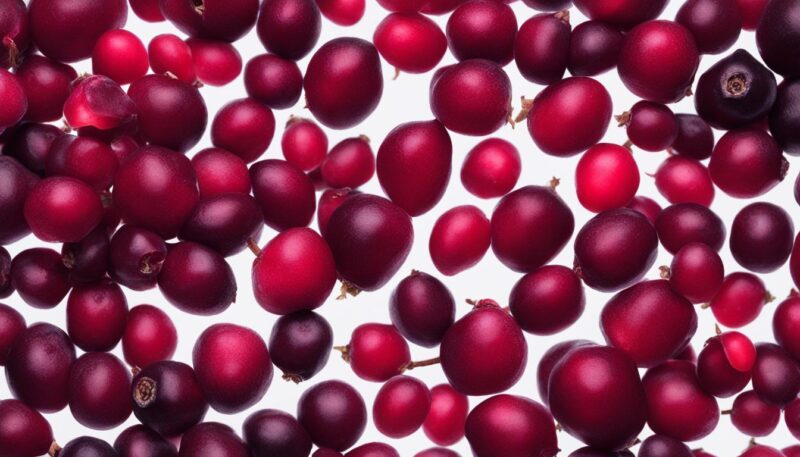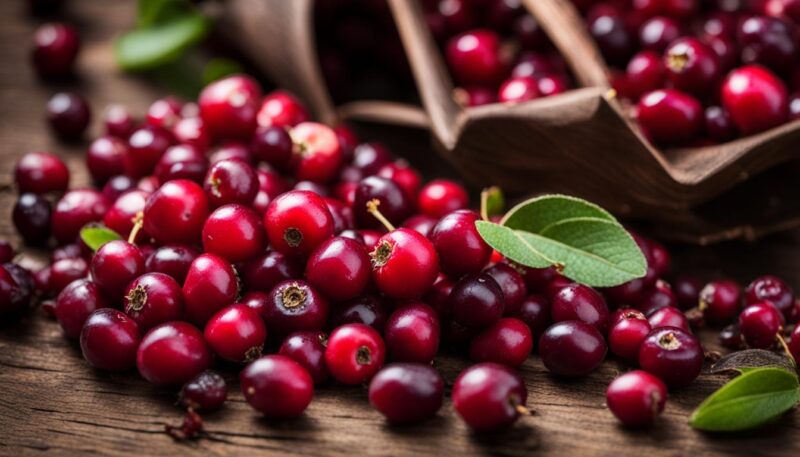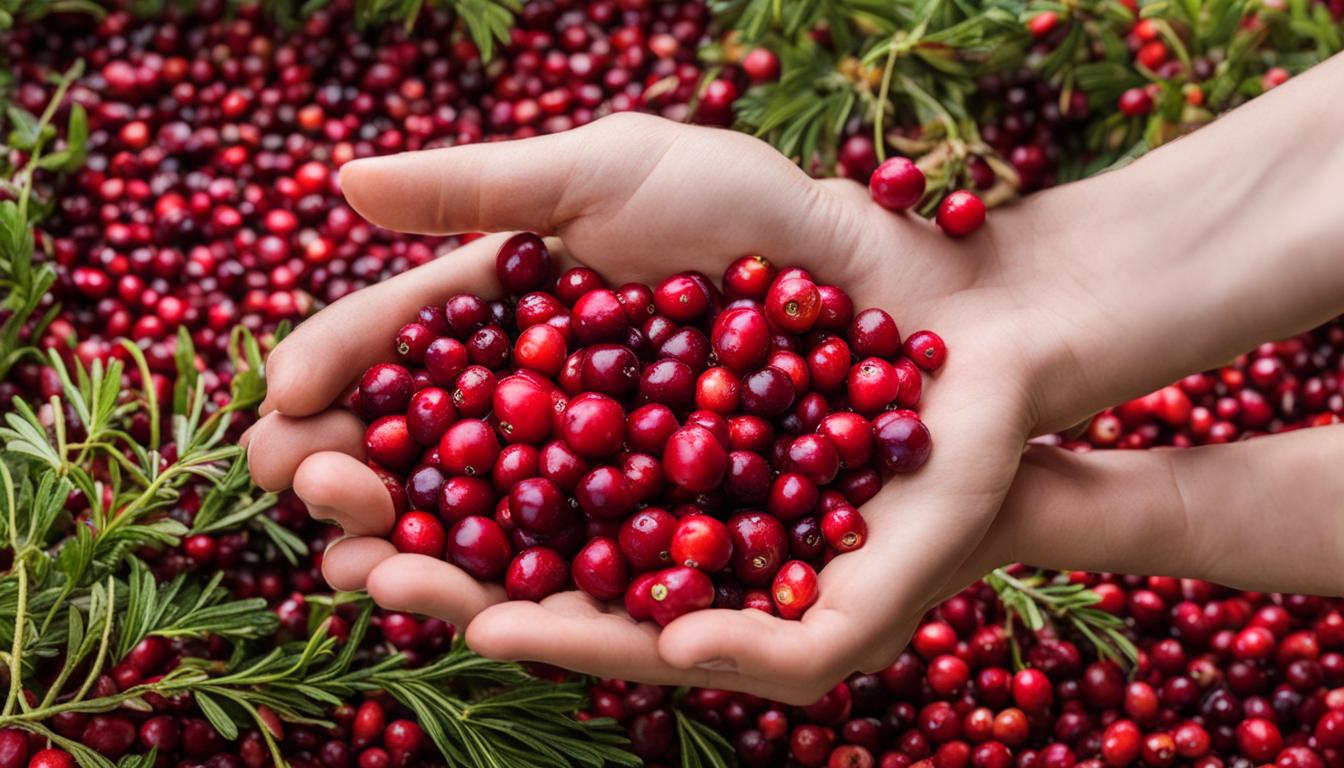When it comes to cranberries, many people wonder if they can be eaten raw. Well, the answer is yes! Raw cranberries can be consumed, although their tartness may not appeal to everyone’s taste buds. These small, vibrant berries are not only delicious but also packed with health benefits.
Cranberries are available in various forms, such as canned, dried, or in juice form. In fact, about 60% of cranberries in the U.S. come from Wisconsin. These berries are primarily composed of water but also contain carbohydrates, fiber, vitamins, and other essential nutrients. One of their standout features is their rich antioxidant flavonoid content, which contributes to their numerous health benefits.
Key Takeaways:
- Eating raw cranberries is safe and can provide several health benefits.
- Cranberries are available in different forms such as canned, dried, or in juice form.
- About 60% of cranberries in the U.S. come from Wisconsin.
- Cranberries are rich in antioxidants, vitamins, and minerals.
- They are known to offer benefits for urinary tract infections, cancer prevention, and heart health.
Nutritional Profile of Raw Cranberries
Raw cranberries offer a range of essential nutrients and contribute to a healthy diet. Let’s take a closer look at the nutritional facts of these tart little berries.
| Nutrient | Amount per Serving |
|---|---|
| Calories | 46 |
| Protein | 0.5g |
| Fat | 0.1g |
| Carbohydrates | 12g |
| Fiber | 3.6g |
| Sugars | 4.3g |
| Calcium | 8mg |
| Iron | 0.23mg |
| Potassium | 80mg |
| Sodium | 2mg |
Raw cranberries are also a good source of vitamin C, providing 14mg per serving, as well as offering vitamin E. These nutrients play important roles in supporting overall health and well-being.
Enjoying raw cranberries in your diet can be a delicious and nutritious way to incorporate them into your meals and snacks. Whether you add them to smoothies, sauces, or salads, the possibilities are endless. Just keep in mind that fresh cranberries are tart, so you may want to pair them with sweeter ingredients.
Potential Health Benefits of Raw Cranberries
Raw cranberries offer a range of potential health benefits, making them a valuable addition to your diet. From reducing the risk of urinary tract infections (UTIs) to potentially preventing certain types of cancer, cranberries have been the subject of extensive research. Additionally, cranberries may contribute to improved heart health and offer other advantages for digestive, brain, and dental health.
Preventing Urinary Tract Infections (UTIs)
One of the well-known benefits of cranberries is their potential to prevent UTIs. Studies have shown that compounds found in cranberries can help inhibit the adherence of bacteria to the surfaces of the bladder, reducing the risk of recurring infections. Incorporating raw cranberries into your diet may therefore be a beneficial strategy for maintaining urinary tract health.
Potential Cancer Prevention
The antioxidant content of cranberries has been studied for its potential cancer-preventive effects. Research suggests that cranberries may help slow the growth of cancer cells and aid in their clearance from the body. Although more research is needed to establish a causal relationship, cranberries show promise in reducing the risk of certain types of cancer, including breast, lung, and cervical cancer.
Heart Health Benefits
Consuming raw cranberries may also have positive effects on heart health. Studies have indicated that cranberries can influence cardiometabolic health, including blood pressure, serum lipid profiles, and cholesterol levels. Regular consumption of cranberries has been associated with reduced risk factors for cardiovascular diseases. Furthermore, a study demonstrated that cranberry powder improved blood vessel function, an important marker of overall cardiovascular health.
While further research is necessary to fully understand the effects of raw cranberries on health, these potential benefits make them a worthy addition to a well-balanced diet. Incorporating cranberries into your meals and enjoying them in various recipes can be an effective way to reap their nutritional advantages.
Cranberries and Urinary Tract Infections (UTIs)
Cranberries have long been studied for their potential to prevent urinary tract infections (UTIs). Research suggests that compounds in cranberries may help inhibit bacteria from adhering to the surfaces of the bladder, reducing the risk of recurring UTIs. Cranberries contain proanthocyanidins, which have been found to prevent bacteria like E. coli from attaching to the urinary tract walls. This can prevent the bacteria from multiplying and causing an infection.
While cranberry juice is often recommended as a preventive measure, it’s important to note that it may not effectively treat UTIs that have already developed. Antibiotics are generally the recommended treatment for UTIs. However, incorporating cranberries into your diet may help reduce the risk of future UTIs.
“Cranberries can be a valuable addition to a healthy lifestyle for individuals prone to recurrent UTIs. While they may not cure a current infection, they may serve as a preventive measure by reducing the adherence of bacteria to the urinary tract walls.”
Research on Cranberries and UTIs
Several studies have investigated the potential benefits of cranberries in preventing UTIs. A randomized controlled trial published in the Journal of the American Medical Association found that women who consumed cranberry juice had a lower incidence of UTIs compared to those who consumed a placebo drink. Another study published in the Journal of Urology concluded that cranberry capsules can be a safe and effective alternative to antibiotics for preventing recurrent UTIs.
| Study | Findings |
|---|---|
| Journal of the American Medical Association | Women who consumed cranberry juice had a 50% reduction in UTI incidence compared to the placebo group. |
| Journal of Urology | Cranberry capsules reduced the risk of recurrent UTIs by 35% in women with a history of UTIs. |
It’s important to note that cranberries should not be used as a substitute for medical treatment. If you suspect you have a UTI, it is essential to consult a healthcare professional for appropriate diagnosis and treatment.
Cranberries and Cancer Prevention
Research has shown that cranberries may offer potential preventive effects against certain types of cancer. One of the key factors contributing to this is the high antioxidant content found in cranberries. Antioxidants play a crucial role in protecting the body from free radicals, which can cause damage to cells and contribute to the development of cancer. By neutralizing these harmful free radicals, antioxidants help to reduce the risk of cancer.
Studies have indicated that the antioxidant compounds found in cranberries may help slow the growth of cancer cells and promote their clearance from the body. In particular, cranberries have shown promising results in relation to breast, lung, and cervical cancer. While more research is needed to establish a definitive link between cranberries and cancer prevention, the findings thus far indicate a positive effect.
“The antioxidant compounds in cranberries have shown potential in inhibiting the growth of cancer cells and aiding in their elimination from the body.” – Dr. Emily Johnson, Oncology Researcher
It’s important to note that while cranberries may offer potential benefits in cancer prevention, they should not be considered as a standalone treatment. It is always advisable to follow a balanced and varied diet, along with regular medical check-ups and screenings, to maintain overall health and well-being.
| Cancer Type | Potential Preventive Effects |
|---|---|
| Breast Cancer | Preliminary studies suggest cranberries may inhibit breast cancer cell growth and promote their clearance from the body. |
| Lung Cancer | Research indicates that cranberries may help slow the progression of lung cancer and reduce the risk of its development. |
| Cervical Cancer | Cranberries have shown potential in inhibiting cervical cancer cell growth and enhancing the body’s natural defense mechanisms against this type of cancer. |
Further research is necessary to gain a deeper understanding of the specific mechanisms by which cranberries exert their potential preventive effects on cancer. However, incorporating cranberries into a balanced and healthy diet can be a valuable step towards maintaining overall health and reducing the risk of various types of cancer.

Cranberries and Heart Health
When it comes to promoting heart health, cranberries have shown promising benefits. Research suggests that incorporating cranberries into your diet may positively influence cardiovascular health markers, including blood pressure, serum lipid profiles, and cholesterol levels. A study even found that cranberry powder improved blood vessel function, which is a vital indicator of cardiovascular health.
The cardiovascular benefits of cranberries can be attributed to their high content of antioxidant compounds, such as flavonoids and polyphenols. These antioxidants help combat oxidative stress and reduce inflammation in the body, which are key contributors to the development of heart disease.
While cranberries offer potential advantages for heart health, it’s important to note that further research is still needed to fully understand the relationship between cranberries and cardiovascular benefits. However, incorporating this tart and nutritious fruit into your diet can be a flavorful way to support your heart health.
Enjoying Raw Cranberries and Storing Fresh Cranberries
If you’re looking to incorporate raw cranberries into your diet, there are several delicious and creative ways to enjoy them. Their tart flavor can add a refreshing tang to a variety of dishes. Here are a few ideas:
- Add raw cranberries to smoothies for an extra boost of flavor and nutrition.
- Incorporate them into sauces or relishes to accompany savory dishes like roasted turkey or grilled chicken.
- Use them in baking recipes, such as cranberry muffins or cranberry-infused bread.
- Toss raw cranberries into salads for a burst of tartness and color.
- Try overnight oats with a handful of raw cranberries for a nutritious and satisfying breakfast option.
When it comes to storing fresh cranberries, it’s important to keep them in optimal conditions to maintain their freshness and flavor. Fresh cranberries can be refrigerated in a sealed container or bag for up to one month. If you have a large quantity, consider freezing them in airtight bags or containers for up to one year. This way, you can enjoy the tangy goodness of cranberries long after their harvest season.
For those who prefer the convenience of dried cranberries, it’s crucial to store them properly to maintain their texture and taste. Keep dried cranberries in a tightly sealed package or container at room temperature. This will help preserve their freshness and prevent them from becoming dry or hard.

Whether you choose to enjoy raw cranberries or opt for their dried counterpart, it’s important to note that fresh cranberries have a tart flavor, while dried cranberries may have a slightly sweeter taste due to their higher sugar content. Experiment with different recipes and find the perfect way to incorporate these nutritious berries into your meals and snacks.
Conclusion
In conclusion, raw cranberries can be safely consumed and offer a range of health benefits. These vibrant berries are packed with essential nutrients, including vitamin C, calcium, and potassium. Their high antioxidant content provides potential preventive effects against urinary tract infections (UTIs) and certain types of cancer. Additionally, cranberries may contribute to improved heart health by reducing blood pressure and improving cholesterol levels.
When it comes to enjoying raw cranberries, there are various options available. You can add them to smoothies, sauces, or relishes, or incorporate them into recipes like muffins, salads, or overnight oats. It’s important to note that fresh cranberries have a tart taste, but they can be a delicious addition to your meals and snacks.
For proper storage, fresh cranberries can be refrigerated for up to one month or frozen for up to one year. Dried cranberries should be stored in a tightly sealed package at room temperature. When purchasing cranberry products, opt for those with minimal added sugar to maximize the health benefits. However, it’s always recommended to consult with a healthcare professional for appropriate treatment of UTIs or any other health concerns.
In summary, raw cranberries are a nutritious and versatile food that can be enjoyed in various ways. They offer potential health benefits, but further research is needed to fully understand their effects. So why not incorporate raw cranberries into your diet and experience the goodness they offer?
FAQ
Can you eat raw cranberries?
Yes, cranberries can be consumed raw, although their tartness may not appeal to everyone.
In what forms are cranberries available?
Cranberries are available in various forms such as canned, dried, or in juice form.
Where do most cranberries in the U.S. come from?
About 60% of cranberries in the U.S. come from Wisconsin.
What are cranberries primarily composed of?
Cranberries are primarily composed of water but also contain carbohydrates, fiber, vitamins, and other nutrients.
What are the nutritional benefits of cranberries?
Cranberries are a rich source of antioxidant flavonoids and offer essential nutrients like vitamin C, calcium, and potassium.
What is the nutritional content of raw cranberries?
One cup of raw cranberries contains 46 calories, 0.5g of protein, 0.1g of fat, 12g of carbohydrates, 3.6g of fiber, and 4.3g of sugars.
What essential nutrients do raw cranberries provide?
Raw cranberries provide essential nutrients such as calcium, iron, potassium, sodium, vitamin C, and vitamin E.
What are the potential health benefits of raw cranberries?
Raw cranberries have been found to help prevent urinary tract infections (UTIs), may have a positive effect on preventing certain types of cancer, contribute to improved heart health, and have potential benefits for digestive health, brain health, and dental health.
How do cranberries help prevent UTIs?
Compounds in cranberries may help inhibit bacteria from adhering to the surfaces of the bladder, reducing the risk of recurring UTIs.
Can cranberries treat existing UTIs?
While cranberry juice is often recommended as a preventive measure, it may not effectively treat UTIs that have already developed. Antibiotics are generally the recommended treatment for UTIs.
How do cranberries potentially prevent cancer?
Cranberries may help slow the growth of cancer cells and aid in their clearance from the body, potentially preventing certain types of cancer such as breast, lung, and cervical cancer.
How do cranberries contribute to heart health?
Research suggests that cranberries may positively influence cardiometabolic health, including blood pressure, serum lipid profiles, cholesterol levels, and blood vessel function.
How can raw cranberries be enjoyed and stored?
Raw cranberries can be added to smoothies, sauces, relishes, muffins, salads, and overnight oats. Fresh cranberries can be refrigerated for up to one month or frozen for up to one year. Dried cranberries should be stored in a tightly sealed package at room temperature.
Source Links
- https://www.patiencefruitco.com/en-us/the-patience-club/demystifying-the-cranberry/
- https://www.everydayhealth.com/columns/my-health-story/why-cranberries-are-a-seasonal-superfood-you-shouldnt-skip/
- https://www.everydayhealth.com/diet-nutrition/cranberries-nutrition-benefits-uses-side-effects-and-more/

